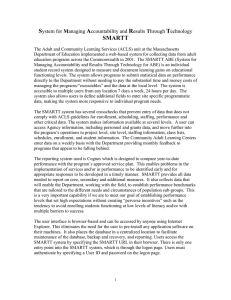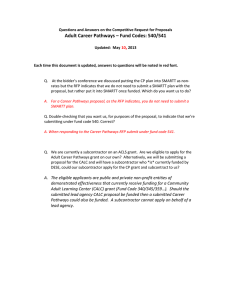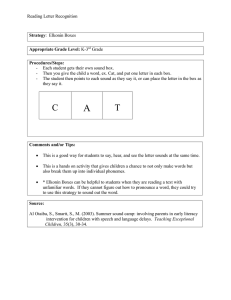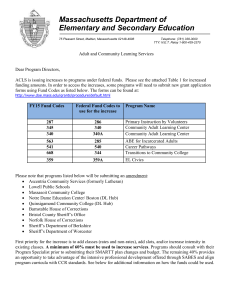2015 0318
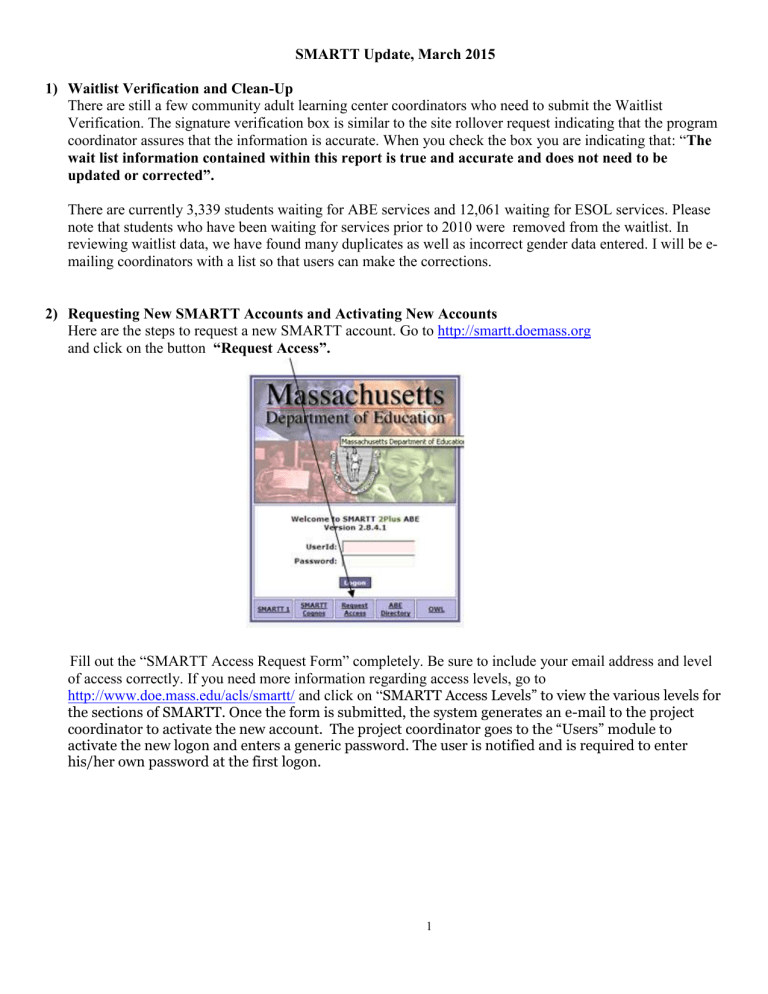
SMARTT Update, March 2015
1) Waitlist Verification and Clean-Up
There are still a few community adult learning center coordinators who need to submit the Waitlist
Verification. The signature verification box is similar to the site rollover request indicating that the program coordinator assures that the information is accurate. When you check the box you are indicating that: “ The wait list information contained within this report is true and accurate and does not need to be updated or corrected”.
There are currently 3,339 students waiting for ABE services and 12,061 waiting for ESOL services. Please note that students who have been waiting for services prior to 2010 were removed from the waitlist. In reviewing waitlist data, we have found many duplicates as well as incorrect gender data entered. I will be emailing coordinators with a list so that users can make the corrections.
2) Requesting New SMARTT Accounts and Activating New Accounts
Here are the steps to request a new SMARTT account. Go to http://smartt.doemass.org and click on the button “Request Access”.
Fill out the Fill out the “SMARTT Access Request Form” completely. Be sure to include your email address and level of access correctly. If you need more information regarding access levels, go to http://www.doe.mass.edu/acls/smartt/ and click on “
SMARTT Access Levels” to view the various levels for the sections of SMARTT. Once the form is submitted, the system generates an e-mail to the project coordinator to activate the new account. The project coordinator goes to the “Users” module to activate the new logon and enters a generic password. The user is notified and is required to enter his/her own password at the first logon.
1
3) Automatic Exit – February 15, 2015
There were 231 students who were auto exited on February 15 th
, 2015 who had no attendance for the months of September 2014 through January 2015. SMARTT automatically exits a student from the site when both conditions below occur:
1) No attendance (class, match, and distance learning curricula attendance) was recorded for that student during the three most recent months which have been “locked out” from data entry, (August,
September, October)
2) No attendance has yet been entered for that student during the current two month period
(November and December ) for which data entry is allowed.
The next auto exit will be on March 15, 2015 for students who had no attendance for October through
February.
Automatic Exit
Schedule
December 1, 2014
January 15, 2015
February 15, 2015
March 15, 2015
April 15, 2015
May 15, 2015
June 15,2015
July 15, 2015
August 15, 2015
September 15, 2015
Month of Last
Attendance
June
July
August
September
October
November
December
January
February
March
No Attendance in
These Months
July – November
August – December
September – January
October – February
November – March
December – April
January – May
February – June
March - June
April – June
System
Assigned
Exit Date
June 30
July 31
August 31
September 30
October 31
November 30
December 31
June 30
June 30
June 30
Number
Exited
420
229
231
4) Entering Non SABES Professional Development
For more than two decades, Massachusetts has provided funding for the professional development of practitioners in its adult learning centers. In the past few years, the need has become more critical for program staff to participate in professional development that is grounded in timely research and best practice. For example, the sharpened focus on college and career readiness for all adult learners requires that teachers have strong knowledge of subjects that are key to adult learners' success in their next steps (i.e.
ESOL, mathematics, reading and writing) and that they demonstrate effectiveness in teaching these subjects.
2
Similarly, program directors and other staff members must be equipped with tools and strategies that support quality instruction.
ACLS requires every staff member in ESE-funded programs-no matter how experienced-to develop and implement an annual professional development plan. One policy requirement is that staff development activities and hours be entered in the professional development database in SMARTT. The reason for this stipulation is that an accurate professional development database allows ACLS to analyze trends, including relationships between training activities and practitioner or student outcomes. Below is a reminder to programs about correct procedures for entering data into SMARTT.
Professional development is defined as a structured learning activity that is designed to strengthen the skills and/or knowledge needed by individual practitioners to perform effectively in their program staff role/s. The terms staff development and professional development may be used interchangeably; both focus on the needs of individuals to improve their work in a system. A third closely related term is program development, which focuses on systems needed to sustain a program.
Staff development may take place through a variety of activities that allow practitioners to study, practice and reflect in the process of acquiring new skills or knowledge. Examples of staff development activities are:
Workshops
Online coursework
Peer coaching
Study circles
Teacher research
Mini-courses and institutes
Visits to another program to learn new practices
Examples of program development activities that do not count as staff development are:
Program staff meetings
Development of a program's continuous improvement plan
Development of a program's curriculum
Teachers, Program Directors, Advisors, Technology Coordinators, and Support Staff members may fulfill their individual professional development requirements by participating in activities offered by SABES,
ESE, or other professional development providers. SABES training activities, including those offered at the annual MCAE Network conference are all listed on the SABES calendar at this link: http://calendar.sabes.org
. SABES enters into SMARTT the data on staff development events that it offers.
Similarly, ESE enters the data on staff development activities that it offers, e.g. New Directors' Orientation.
Data on professional development (PD), other than that provided by SABES or ESE, must be entered into
SMARTT by the program. This PD must relate directly to an individual's staff position. PD that is unrelated to a person's ABE/ESOL job role should not be entered in SMARTT. Practitioners should consult with their
Program and Staff Development Facilitators or supervisors to connect their PD activities to their job responsibilities. Program Directors should, in turn, decide on the appropriateness of the PD as it relates to program development goals.
Events that some programs have listed incorrectly in SMARTT in the past include:
Staff meetings
Individual meetings with supervisors
ESE monitoring exit meetings
3
Annual ABE Directors' Meeting
ALI Meetings
A yoga class
These activities do not count as staff development because they 1) involve no structured learning activity, 2) focus on program or state-level issues rather than on individual staff needs, or 3) do not relate to an ESE staff role.
In order to enter staff PD hours, locate the "Add Non-SABES PD" screen through the Staff PD link in the
Staff Information screen in SMARTT. If you need additional information or assistance for data entry, please contact your Program Specialist or go to http://smartthelp.zendesk.com
to submit your issue .
5) Change in Cognos Desk Review Section
The Desk Review cubes can now be viewed in a report format. The filters are Fiscal Year, Site Specialty, and Columns. The columns are Attendance, Goals, and All. Therefore users can view the data for all sites in one Attendance report and get percent attendance and average hours in one report.
If the user selects “All” for columns, the user will see the Attendance and Goal data in one report.
4
6) SMARTT/Cognos Trainings and Support
Check the upcoming trainings on the SABES website at http://calendar.sabes.org
. To register, click on the register icon on workshop title on the SABES calendar.
Intro to Cognos Online: March 23, 2015 – April 4, 2015
Presenter: Charlie Herbert
Participants will learn about key features and areas in Cognos, how to run essential performance data reports, create, save, and print reports and manage reports in your individual area. This is an online event. It will be delivered using the Moodle learning management system. The presenter, Charlie Herbert, will contact participants in the week prior to the event.
Objectives:
Participants will login, navigate in different areas and tabs in Cognos
Use toolbar functions to customize reports
Run typical desk review and federal reports
Learn how to manage reports and views
This includes creating, accessing, saving in Cognos and saving locally, exporting to Excel or PDF, and printing. It will include an introduction to working with cubes as well.
Intermediate Cognos (Online): April 3, 2015 10:00 am – 12:00 pm
Presenter: Charlie Herbert
This is an online realtime event. A phone suitable for conference call and a web connected computer are required. Further contact information will be sent in the week prior to the event.
Would you like to generate nice looking reports for meetings that will better inform your staff, your board of directors, your students etc? This two hour workshop can help you be more confident in Cognos Generate your own reports, save them to run them later. Take a previously generated report and custom edit it for your own needs.
Objectives:
Create, save, export, and print a customized view from the Attendance, Student by Site, and/or Goals
Cube
Use toolbar icons and adjust settings so that the view always runs with current data
Adapt a view from Favorite reports to reflect relevant site data
For SMARTT or Cognos technical assistance, bookmark http://smartthelp.zendesk.com
. At that page, in the upper right, click "Submit a Request ( https://smartthelp.zendesk.com/hc/en-us/requests/new )" or just browse the help files there.
Questions?
Please contact Donna Cornellier at dcornellier@doe.mass.edu
5
